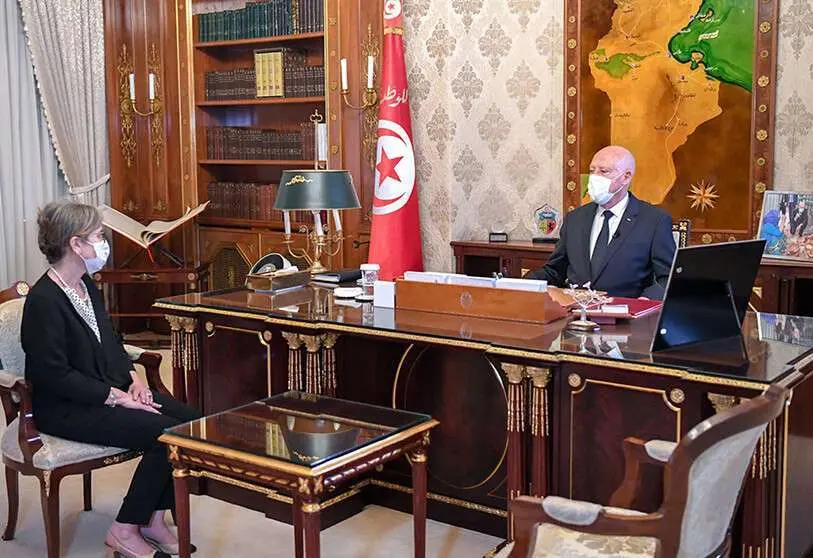President Saied appoints Najla Bouden Romdhane as Tunisia's prime minister

After seventy days of constitutional crisis in Tunisia, which began with the dissolution of parliament, the dismissal of the executive and the concentration of full powers on President Kais Saied, the latter has once again surprised all and sundry with the appointment of the geologist Najla Bouden Romdhnane as prime minister. She is the first woman to be given the task of forming a government not only in the history of the North African country, but also in the history of the Arab world.
The Tunisian presidency announced Bouden's appointment in a terse statement on Wednesday: "In accordance with the provisions of Presidential Order number 117, the President of the Republic has appointed Mrs Najla Bouden Romdhane to form the government". With this move, Saied restores executive power a week after suspending a large part of the constitution and prolonging his powers in the face of unrelenting pressure from the international community.
The victory "is an honour for Tunisia and a tribute to Tunisian women", the president stressed. However, he has made it a condition for the successor to the ousted Hichem Mechichi that the formation of a government "be done as soon as possible". Saied hopes that the cabinet will be fully formed in the next few hours or days, because "we have lost a lot of time", he stressed, while highlighting the need to combat corruption and institutional anarchy.

Najla Bouden Romdhnane (Kairouan, 1958) was until now director general of "Promise", a project under the Department of Higher Education and Scientific Research aimed at modernising Tunisia's education system. A decade earlier, Bouden had headed the cabinet of the Ministry of Education. A curriculum that confines his political activity to the field of academic education. However, the challenges facing the country are varied and far-reaching, areas in which she is accused of inexperience.
The scientist thus becomes the eighth Tunisian head of government since the Arab Spring, the third under Saied's presidency. Tunisia's post-revolutionary prime minister, Hamadi Jebali, remains the longest-serving Tunisian prime minister. None has exceeded two years at the helm of the executive branch, a record that does not favour the long-term continuity of the newly appointed Bouden.
It is likely that she will not enjoy the same prerogatives as the prime minister to date. President Saied has had full powers for the past two months and intends to repeal the constitution or, at the very least, to broadly amend its content. His ambitions are to turn the country into a presidential republic, similar to the French one.

Tunisia witnessed the emergence of the revolutionary outbreak in 2011. The Arab Spring was born with the 'firebombing' suicide of street vendor Mohamed Bouazizi and the outrage quickly spread across the Arab world. Its pioneering status and the rapid overthrow of autocrat Zine el Abidine Ben Ali gave the country the label of 'rara avis' as the first Muslim state to embrace a democratic system. A breakthrough that was consolidated with the adoption of the Constitution in 2014.
But the Magna Carta was not without flaws. The most serious of these was that Tunisia's political authority was divided into too many power centres. A sort of tricephaly, consisting of the presidency, the government and the parliament, prevented effective progress and pushed the occupants of the different institutions to jostle for their share of power.
Instability seemed perennial until Saied made a constitutional shift in July, which many did not hesitate to label a coup d'état. The president then decided to arrogate to himself full powers under the pretext of Article 80 of the Magna Carta. A rule that grants full powers to the head of state in the event of "imminent danger to the institutions" after consultation with the speaker of the House of Representatives and the prime minister, conditions that were not met.

The professor of Constitutional Law, who swept to power without a political platform and with more than 70 percent of the vote, maintained his opposition to the current Magna Carta from the outset, despite having been one of its drafters, and received the majority support of Tunisian society after arrogating full powers to himself.
His rivalry with the Islamist Ennhada formation was another of the determining points of his political action. The president blames the party, which has been present in every government since the revolution, for the precarious state of the country and the institutional paralysis. A situation mortally wounded by the COVID-19 crisis. The appointment of a female prime minister clears up the constitutional uncertainty and gets the executive branch, which has its work cut out for it, back on track.









